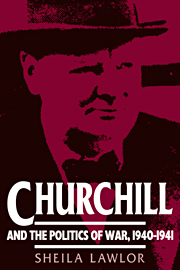Book contents
- Frontmatter
- Contents
- Acknowledgements
- List of abbreviations
- Introduction
- Retrospect
- Part 1 Churchill, the conservative party and the war
- Part 2 The Middle East, imperial defence and the Balkans (October to December 1940)
- Part 3 The Greek Decision (January to March 1941)
- General conclusion
- Bibliography
- Index
- Frontmatter
- Contents
- Acknowledgements
- List of abbreviations
- Introduction
- Retrospect
- Part 1 Churchill, the conservative party and the war
- Part 2 The Middle East, imperial defence and the Balkans (October to December 1940)
- Part 3 The Greek Decision (January to March 1941)
- General conclusion
- Bibliography
- Index
Summary
In reflecting on this book, the advocate of Churchill and Churchillian historiography might suggest that concentration on so short a period and so particular a subject misses the overall and sweeping perspective which Churchill brought to the war. Reappraisal of his role should address itself to his wider vision of the war, and the period of the Grand Alliance: the many decisions in each of the different theatres; the interventions on even the smallest or most arcane matters; relations with Roosevelt and Stalin when Britain, the United States and the Soviet Union fought as allies to defeat Germany and the Axis powers in a global war from the Atlantic to the Pacific. At no stage did Churchill abandon the grand and bold sweep which emerged in Churchillian historiography. By contrast this book may appear parochial, and unrepresentative, concerned as it is with the short period when Britain fought for the most part alone. By virtue of its narrow scope and timescale, such a book could not constitute an authoritative challenge to the broad Churchillian view.
It is certainly true that the book only considers the first ten months of Churchill's wartime leadership before America and the Soviet Union joined the war. And its concerns are particular. It begins with Churchill's becoming prime minister; examines how he established himself in that position; considers the dominant, but particular, strategic problems to which his government responded – the fall of France, the Battle of Britain, and the security of the Middle East in which the Balkans was to become implicated.
- Type
- Chapter
- Information
- Churchill and the Politics of War, 1940–1941 , pp. 257 - 259Publisher: Cambridge University PressPrint publication year: 1994

